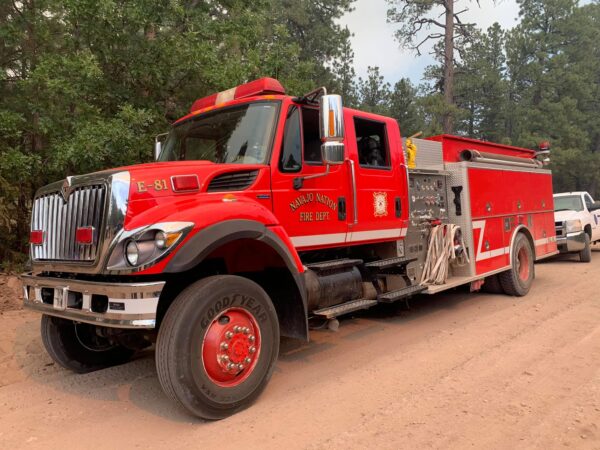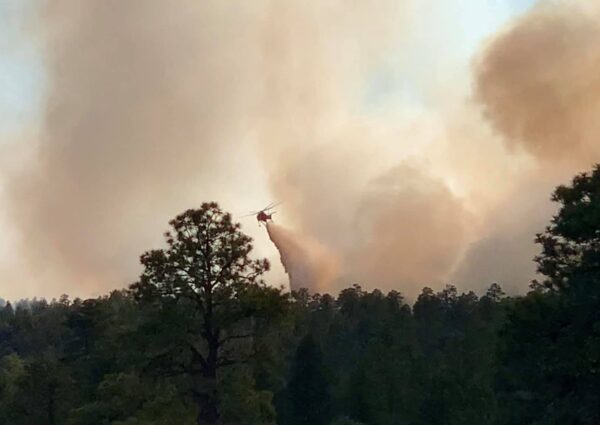
- Details
- By Levi Rickert
WINDOW ROCK, Ariz. — Already working to control the spread of COVID-19 on the Navajo Indian Reservation, Navajo Nation leaders on Thursday urged its tribal residents and visitors to avoid using fireworks over the Fourth of July weekend.
Because of COVID-19, the Navajo Indian Reservation will be under a 57-hour lockdown this weekend. Thursday’s warning comes because of extreme dry conditions on the nation’s largest Indian reservation.
The dry weather contributed to the spread of a wildfire that began on Saturday, June 27 that was started by lightning three miles east of Wood Springs, Arizona.
 Helicopter attempting to contain fire near Wood Springs, Arizona on Navajo Nation on Wednesday, July 1, 2020.“Please help protect our lands, our communities, and our people by making smart decisions and not using fireworks or open fires, especially during the holiday weekend. The Navajo Nation is in a drought and we have plenty of dry brush, dry vegetation, and other fuel that can spread fire quickly. Our first responders have their hands full fighting the Wood Springs 2 Fire and COVID-19, so please think of them and their families. We strongly urge everyone to take precautionary measures to ensure that you, your loved ones, and neighbors will be safe,” President Jonathan Nez said in a statement.
Helicopter attempting to contain fire near Wood Springs, Arizona on Navajo Nation on Wednesday, July 1, 2020.“Please help protect our lands, our communities, and our people by making smart decisions and not using fireworks or open fires, especially during the holiday weekend. The Navajo Nation is in a drought and we have plenty of dry brush, dry vegetation, and other fuel that can spread fire quickly. Our first responders have their hands full fighting the Wood Springs 2 Fire and COVID-19, so please think of them and their families. We strongly urge everyone to take precautionary measures to ensure that you, your loved ones, and neighbors will be safe,” President Jonathan Nez said in a statement.
Even before Saturday’s fire broke out, the tribal leaders anticipated a dry season that would create the potential for wildfires on the Navajo Nation. On May 15, Navajo Nation Nez and Navajo Area BIA Regional Director Bart Stevens issued Stage 2 Fire Restrictions that prohibit fireworks, trashing burning, wood burning, campfires, discharging a firearm except while engaged in a lawful hunt, use of chainsaws and welding torches with open flames.
Fines may reach as high as $5,000 for violations.
Navajo Nation Law states that possessing, discharging, manufacturing, sale or use of fireworks or other pyrotechnic device is unlawful. All public exhibition shows such as firework shows require a permit that would be considered a “drive in” gathering under the public health emergency order, thus not permitted during lockdown hours.
The Navajo Nation has issued another Public Health Emergency Order that implements full 57-hour weekend lockdowns from July 3, 2020 to July 6, 2020 from July 10, 2020 to July 13, 2020, and from July 17, 2020 to July 20, 2020, starting at 8:00 P.M. (MDT) on Friday and ending at 5:00 A.M. (MDT) on Monday.
The Navajo Police Department and the New Mexico National Guard will partner over the holiday weekend to set up checkpoints to enforce the weekend lockdown.
For more information, contact the Navajo Forestry Department at (928) 729-4007. To report fires contact the Bureau of Indian Affairs Navajo Region Fire at (928) 729-2307. For more information about the 57-hour weekend lockdowns and daily curfews contact the Navajo Nation Health Command Operations Center at (928) 871-7014.
More Stories Like This
Native News Weekly (August 25, 2024): D.C. BriefsNative News Weekly (March 1, 2026): D.C. Briefs
Scope Narrowed, Report Withheld: Questions Mount Over Michigan Boarding School Study
Zuni Youth Enrichment Project Announces Family Engagement Night and Spring Break Youth Programming
Next on Native Bidaské: Leonard Peltier Reflects on His First Year After Prison
Help us defend tribal sovereignty.
At Native News Online, our mission is rooted in telling the stories that strengthen sovereignty and uplift Indigenous voices — not just at year’s end, but every single day.
Because of your generosity last year, we were able to keep our reporters on the ground in tribal communities, at national gatherings and in the halls of Congress — covering the issues that matter most to Indian Country: sovereignty, culture, education, health and economic opportunity.
That support sustained us through a tough year in 2025. Now, as we look to the year ahead, we need your help right now to ensure warrior journalism remains strong — reporting that defends tribal sovereignty, amplifies Native truth, and holds power accountable.
 The stakes couldn't be higher. Your support keeps Native voices heard, Native stories told and Native sovereignty defended.
The stakes couldn't be higher. Your support keeps Native voices heard, Native stories told and Native sovereignty defended.
Stand with Warrior Journalism today.
Levi Rickert (Potawatomi), Editor & Publisher

